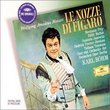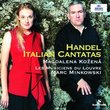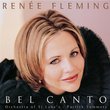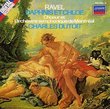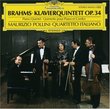| All Artists: Wolfgang Amadeus Mozart, Herbert von Karajan, Philharmonia Orchestra of London, Elisabeth Schwarzkopf, Lisa Otto, Léopold Simoneau, Nan Merriman, Rolando Panerai, Sesto Bruscantini Title: Mozart: Cos� Fan Tutte Members Wishing: 0 Total Copies: 0 Label: EMI Classics Original Release Date: 1/1/2006 Re-Release Date: 1/10/2006 Album Type: Original recording remastered Genre: Classical Styles: Opera & Classical Vocal, Historical Periods, Classical (c.1770-1830), Modern, 20th, & 21st Century, Symphonies Number of Discs: 3 SwapaCD Credits: 3 UPC: 094633678927 |
Search - Wolfgang Amadeus Mozart, Herbert von Karajan, Philharmonia Orchestra of London :: Mozart: Cos� Fan Tutte
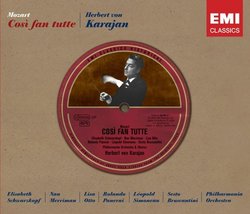 | Wolfgang Amadeus Mozart, Herbert von Karajan, Philharmonia Orchestra of London Mozart: Cos� Fan Tutte Genre: Classical
|
Larger Image |
CD DetailsSimilarly Requested CDs |
CD ReviewsAN INEXPENSIVE EDITION OF A CLASSIC PERFORMANCE L. Mitnick | Chicago, Illinois United States | 01/29/2006 (5 out of 5 stars) "EMI had been incredibly consistent with their Mozart opera recordings in the 1950's. Of course, their great fortune was to have conductors like Van Karajan, Giulini, and Furtwangler under contract. It was an age of great Mozart singers---Elisabeth Schwarzkopf, Anton Dermota, Irmgard Seefried, Sena Jurinac, and Leopold Simoneau - all of whom recorded for EMI. By 1954, Schwarzkopf and Von Karajan were already big ticket talent at EMI (they also had exclusive contracts with Maria Callas, Victoria de los Angeles, Nicolai Gedda, Tito Gobbi, Giuseppe di Stefano ---- seven-eighths of the greatest opera singers in the world at the time). This recording of Mozart's "Cosi Fan Tutte" comes from the height of that period, and it's very impressive indeed. Von Karajan's musicians make the most of Mozart's lush music, and the entire performance has a "float" to it that I find eludes other presentations of this opera. The legendary and gifted Schwarzkopf sings a beautiful Fiordiligi ---her "Come Scoglio" a real piece of virtuoso singing covering a span of two and a half octaves. Her singing throughout the opera is exemplary (I cannot understand one critic years ago referred to her performance as "pufferies of sound"---he's dead wrong!). Schwarzkopf is well contrasted by Nan Merriman's Dorabella. Merriman was an American mezzo who frequently sang at the Met, and who could reach impressive vocal and interpretive heights when surrounded by artists of the caliber encountered in this performance. I know of no tenor recorded in the role of Ferrando who sounds as honeyed and lyrically beautiful as Leopold Simoneau -------this French-Canadian tenor was surely one of the great Mozart singers of virtually any generation. Rolando Panerai's light baritone is ideal for Guglielmo (Panerai was a used by EMI in a good share of their earliest Callas operas - and always made a good impression), and his sense of comedy is apt and highly appropriate in a role which, to be most effective, can't be overdone. Sesto Bruscantini, with his extensive experience in the buffo operas of Rossini, provides a robust Don Alfonso, and Lisa Otto is a cute and incisive Despina. EMI is to be commended for making this wonderful performance available at such an inexpensive price. When it comes to Mozart operas, especially with the recordings EMI made in the 1950's, older is definitely better! Now ---- they need to release their legendary recording of "Die Entfuhrung Aus Dem Serail" with Leopold Simoneau. Highly recommended." Karajan versus Bohm in Cosi Santa Fe Listener | Santa Fe, NM USA | 03/20/2006 (4 out of 5 stars) "Whereas EMI was fortunate enough to make one Don Giovanni and one Marriage of Figaro for the ages, both under Giulini, they achieved mixed results with two versions of Cosi fan tutte. Neither is an obvious first choice, so I thought it was worthwhile comparing their respective pluses and minuses. Karajan (1954): This mono recording is in good enough sound to compete successfully with Bohm's stereo version, with the singers placed very close up. They achieve a great deal of intimacy and nuance. Karajan favors tempo extremes, taking Schwarzkopf's two big arias, as well as her opening duet with Merriman, quite slowly. Stylistically, his approach is ultra-suave, which yields benefits in Bruscantini's sly urbanity as Don Alfonso, for example, but in the long run proves more than a little precious. As Fiordiligi, Schwarzkopf is younger and fresher than in Bohm's set, but there she has gained in artistry. Simoneau and Panerai are great as the two heros, probably the best pair on records. Nan Merriman as Dorabella is musically satisfying, but she has a fast beat in her voice that wears after a while. Bohm (1963): This later performance is in good stereo, with the voices placed further from the mike than in Karajan's recording. Where Karajan is suave, Bohm is blunt. He misses many opportunities for subtle phrasing, yet given the choice, I'd rather hear his plain-faced Cosi than Karajan's overly sophisticated one. As to tempos, bohm is rrelaxed and often just as slow as Karajan--period performances from Ostmann, Gardiner and Jacobs go much faster. In the Karajan set the men were stronger than the laides; here it's the reverse. Schwarzkopf and Ludwig make ideal sisters, unrivalled for their musicality, even if Schwarzkopf can no longer quite negotiate Fiodiligi's cruelly difficult arias. The male pair are certainly good, but I find Alfredo Kraus's voice dry and his manner stiff; Taddei is fine, howevr. Walter Berry makes for a bluff Don Alfonso without a trace of Bruscantini's sly malice. Naturally, thee's much more to say in detail, but I think I've given a fair sketch of the two performances. I've lived with both for a long time, and it pains me to say that on balance I prefer Karl Bohm, even though he is far from being a favorite conductor. The comvinaiton of Schwarzkopf and Ludwig carries the day." Una de la mejores interpretaciones en CD del Cosi fan tutte P. Emilio Rossi | Caracas, Venezuela | 11/16/2006 (5 out of 5 stars) "Esta es una de las mejores interpretaciones en CD del Cosi Fan tutte, en compañìa de la versión de Böhm de 1962. Uno de los méritos fundamentales de esta excelsa grabación es la magnífica dirección de Karajan. El maestro austriaco se demuestra en todo momento como un estilista consumado, obtiene timbres orquestales sugerentes y refinados, construye y define adecuadamente lo que es el "dramma giocoso", con gracia, con humor y justos toques de seriedad, todo con una elegante presición. Cuenta, por lo demás, con un cast abolutamente modélico; Elizabeth Schwarzkopf es considerada unánimemente por todos los criticos musicales como la intérprete de referencia del rol de Fiordiligi, por su imponente modo de esculpir y modelar las frases con un estilo y elegancia de fraseo espectaculares. Leopold Simoneau, es un Ferrando sutil e insinuante, ideal por su voz leve, clara y robusta a la vez. Es junto a Alfredo Kraus, de la versión Böhm 1962, el mejor intérprete histórico de este rol. Lisa Otto configura con musicalidad, vitalidad y fino humor una Despina excelente. Sesto Bruscantini, es sin duda el Don Alfonso de referencia, por su fina ironia y discreta elegancia, aunado a la belleza de su voz baritonal y excelente técnica. Rolando Panerai es el barítono brillante que todo aficionado serio a la opera conoce a la perfección. Excelente técnica, fraseo inteligente e incisivo, en suma un Guglielmo de referencia. Quizás el punto un poco mas debil del cast sea la Dorabella de Nan Merriman, pero solo si se la compara con el resto del cast, ya que se trata de una fina artista, muy musical y de excelente estilo (es necesario recordar que fue una de las artistas preferidas del gran Arturo Toscanini). En suma un clásico absoluto de la discografia, reconocido casi por unanimidad, por toda la crítica especializada y por los mozartianos en particular. Sería interesante comprarla junto a la versión de Böhm de 1962, ya que las dos son complementarias y no excluyentes."
|

 Track Listings (32) - Disc #1
Track Listings (32) - Disc #1